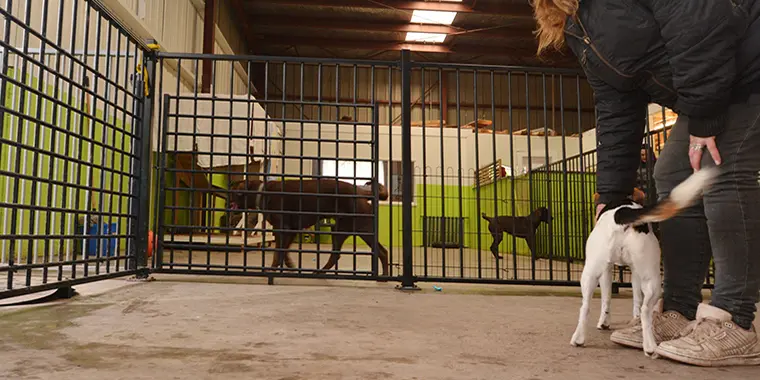
Summer is here, and many of us like to go on vacation or road trips during this time of year. But what about your canine family member? Ideally, your dog gets to come along, and websites like BringFido.com can help you find accommodations away from home for you and your dog. Separation from the family pack, especially for an extended period, is stressful for most dogs, so if you can avoid it, do. Some dogs handle these separations better than others, but no dog enjoys being left behind. If your buddy can’t join in, boarding your dog at a good daycare facility can be an option. Let’s look at some considerations to keep in mind.
Consider Boarding Alternatives
Just because you are leaving doesn’t mean your dog has to. Remaining in a familiar home environment is far less stressful for your dog than in a strange and unfamiliar place. Getting set up with a good in-home pet sitter way ahead of time is a good alternative. If you add a reputable pet sitter to your dog’s regular support team, your dog has a familiar person to spend time with while you are away. A trusted pet sitter who stays at your home during your absence also has many other advantages. Your mail is collected, your home is far less likely to be burglarized, the flowers get watered, and so on. Finding someone you trust can take a while, but your dog trainer, groomer, or veterinarian may have a recommendation you can interview and try out.
Make sure you get comfortable with a pet sitter months before your vacation. While convenient, websites advertising and referring pet sitters and dog walkers got a lot of negative press for the poor performance of many providers; some dogs have even died. I recommend hiring a professional pet sitter who can provide references. The neighborhood kid is probably also not the best choice. In contrast, a trusted dog-savvy friend or relative can be a great option. You want someone comfortable with your dog, especially when you have a powerful breed like a German Shepherd.
Finding a Good Boarding Place
Ask your other pet service providers, for example, your dog trainer, for recommendations. People in the pet care industry are usually familiar with who in your neighborhood has a good reputation and who doesn’t. Ask them where they would board their dog if they had to. Many dog trainers also board their client’s dogs. Maybe the vacation is the perfect time for a good board-and-train program for your dog. It can never hurt to ask. Once you have selected a few boarding options, call them and ask how their service works and if you can tour their facility to see their operation.
You want to stay away from a boarding business that seems secretive. A reputable place will happily have you stop by, meet the staff, see how everything works, and explain their service. Many facilities have multiple boarding options, including private rooms or group rooms, 24/7 video feeds to watch your pooch using your phone, and daily play and/or walking times. Pick what is best for your dog. Ensure the boarding facility is familiar and comfortable with your dog’s breed. German Shepherds have different needs than Rottweilers, Pit Bulls or Chihuahuas, and so forth. Talk to the manager, meet the staff, and ask other customers you may encounter about their experience.
Understand Vaccination Requirements for Boarding
All reputable boarding places will require proof of vaccination for the core vaccines Rabies, Parvo, and Distemper, sometimes Hepatitis, and usually Bordetella (for Kennel Cough). There could be additional requirements if you are in a high-risk area for less common but serious diseases. Sometimes recent fecal tests are also necessary to show your dog is free of parasites. You want your dog to be protected and not exposed to unnecessary risks, so vaccinations are important. However, stay away from boarding facilities that demand all kinds of other, less common vaccines for no valid reason. Any vaccination requirement beyond Rabies, Parvo, Distemper, Hepatitis, and Bordetella should require a good reason.
I prefer facilities that allow titer tests instead of vaccinations. Titer tests show that your dog has enough antibodies for disease and is immune. A new vaccination for a disease is only necessary once the antibody count has fallen below a certain level. More and more holistic veterinarians can perform these simple blood tests in-house for very little cost. Educated boarding facilities will accept titer tests as they help prevent unnecessary over-vaccinations. However, some boarding facilities request a new Bordetella vaccination every six months. That is a misguided, irresponsible, and biologically indefensible demand. I would not board my dog at such a facility.
Initial Boarding Health Checks
Reputable boarding places will examine your dog upon drop off and note any existing scars, scratches, or wounds on the check-in sheet. This is good for you and the business as it establishes an agreed-upon baseline health condition.
Boarding Staff Competence
Ensure you have confidence in the staff handling your dog in your absence. I.e., if you have a large breed like a German Shepherd, do you have confidence that your dog will be safe with them? Do you feel they would still handle your dog with kindness should he be involved in a dog fight; it happens. Do they understand your breed and its needs? Make sure you have satisfying answers to these questions.
Kennel-Free Boarding is Risky
Kennel-free boarding businesses have become more common in recent years. That may sound appealing, but is it a good idea? The risk of injury and death to dogs increases substantially in such a setup. No matter how well the business believes, its staff is trained. It’s a huge gamble with your dog’s life. Boarding your dog when you’re away should give you peace of mind, not anxiety.
Food During Boarding
Is the business able and willing to maintain your dog’s feeding routine? A reputable boarding place will keep up your dog’s feeding regimen in your absence, including raw food diets. Disrupting your dog’s food routine causes unnecessary additional stress. Avoid it if possible.
Emergency Boarding Procedures
Of course, you hope it all goes well, but what if it doesn’t? What are their procedures when things go wrong? How do they handle medical emergencies? Are they prepared for earthquakes, tornadoes, or other natural disasters? Will you be notified immediately? Is an emergency veterinary hospital close by? Is all staff trained on emergency procedures? These are important questions you should have answers to, and of course, you should trust them long before your trip.




